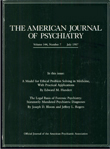Premorbid brain size as a determinant of reserve capacity against intellectual decline in Alzheimer's disease
Abstract
OBJECTIVE: Both the magnitude of brain atrophy and premorbid brain size determine the volume of the brain affected by Alzheimer's disease. To examine the possibility that premorbid brain volume is a determinant of cognitive reserve in patients with Alzheimer's disease, the relation between diffuse brain atrophy and cognitive decline and the impact of premorbid brain size on cognitive decline were studied in patients with Alzheimer's disease. METHOD: By measuring whole brain volume and intracranial volume in 60 patients with probable Alzheimer's disease, mild to moderate in severity, with the use of high-resolution magnetic resonance imaging and image processing, the authors studied the impact of premorbid brain volume and magnitude of diffuse brain atrophy on cognitive functions. On the basis of the normative brain-calvarium relationship derived from data an 28 healthy adults and the total intracranial volume measure of each patient, the magnitude of brain atrophy and premorbid brain volume were estimated. RESULTS: After control for the effects of age, sex, and education as confounding factors, it was found that the Alzheimer's disease patients' intelligence was correlated both positively with premorbid brain volume and negatively with magnitude of brain atrophy, while impairments in language and memory were correlated with magnitude of brain atrophy but not with premorbid brain volume. CONCLUSIONS: These findings partially support the hypothesis that premorbid brain volume is a determinant of reserves against intellectual decline in Alzheimer's disease.



